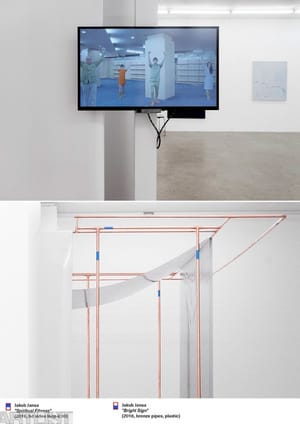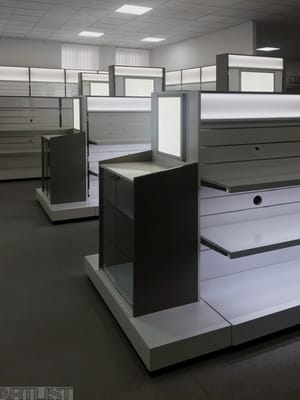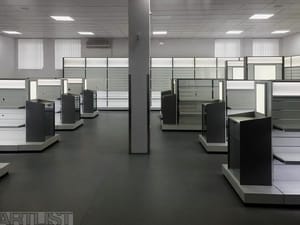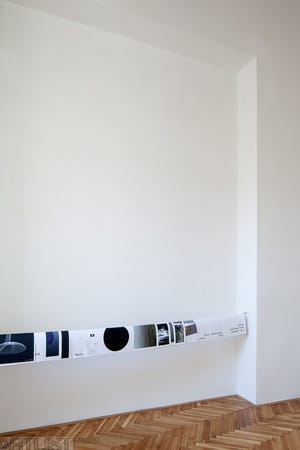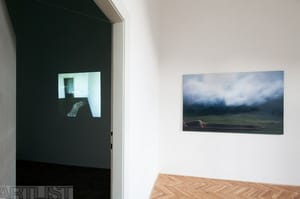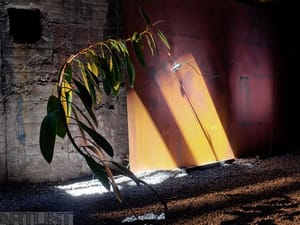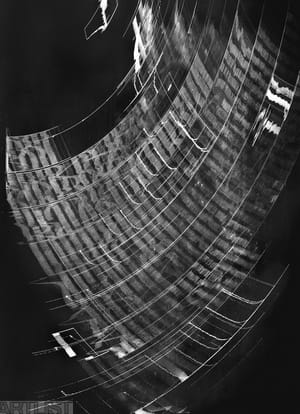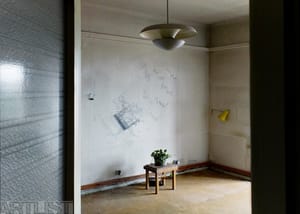- First Name
- Jakub
- Surname
- Jansa
- Born
- 1989
- Birth place
- Praha
- Place of work
- Praha
- Website
- https://jakubjansa.com/
- Keywords
- CSU Library
- ↳ Find in the catalogue
About artist
Jakub Jansa is one of the distinctive personalities of the new generation of artists whose work is closely related to current issues of the global, digital and virtual world, but also to the examination of positions of art and the artist in it. He places strong emphasis on the presentation of his work and thus creates original installations and specific environments. He works with both static, as well as moving images, with photograph, new technologies or the simulation thereof, with objects and performances, and primarily with the overall architecture of an exhibition. His work is characteristic for emphasizing detail, perfection and cleanliness almost to the point of being sterile. In his exhibition projects he often gets the viewers and visitors involved, as well as performers, including himself, and he evokes controlled or planned situations relating to the given project. He utilizes principles from the world of company teambuilding, coaching, visionary projects and other systems or organizations, offering a recipe for how to change the world, make our lives better, increase productivity and be successful, and primarily gain control over things. He adopts these processes and strategies in an effort to find their archetypal model, which is also related to the issue of the relationship between man and his/her surrounding world, nature and landscape. In a subversive way Jansa systematically processes notions such as that of a prophet, revolution or being a visionary. He comments it in the following way: “We are taking control over the freely originating. We are developing landscape and modifying it. We are rotating the planet and keeping the world going.”
These topics started to appear in his work already while studying at the Academy of Arts, Architecture and Design in Prague from where he graduated under the guidance of Federico Díaz and David Kořínek. His studies in the Studio of Supermedia certainly influenced his approach and reflection in the context of contemporary art and questions relating to it including the role art can play today, the position an artist has in society, and whether he/she has the possibility to influence or even transform it. As was already insinuated, Jakub Jansa views the mentioned topics from a distance, which is manifested in his work together with a certain dose of irony and humour, which the artist works with intentionally.
One of the first works where he plays this game of uncertainty of a concealed absurdity is Engstligenalp (2014). It is a concept of utopian “landscape-making” project, the goal of which is to create a cave complex on a Swiss plateau artificially with the help of a precisely described device. What is misleading here is the preciseness of the location as well as the instructions on how to create this device, but the concept gains on credibility mainly due to the modern approach to landscape – after all “nature” remodelled by man is nothing unusual anymore. What the artist is primarily interested in is the question of progress when we get from prehistoric cave paintings to creating “our own” caves and “our own nature” that we have control over.
We can observe a specific type of humour and self-irony in many Jansa’s exhibitions. He has an interesting way of inserting them in his performances in which he works with the principle of game and fiction. In his situation games he directs his actors whom we cannot distinguish from other visitors and who, as part of their roles, evoke absurd situations: like when at an exhibition opening the performers hidden among the visitors precisely mimicked the artist’s movements. Elsewhere they would discreetly ingratiate the attention of the viewers by showing them the artist’s works on their mobile phones.
Perhaps Jansa’s most distinctive project, where all of the already mentioned approaches and tendencies came together, is Spiritual Fitness (2016), Jansa’s thesis work which was presented as a student exercise movement at the Academy of Arts, Architecture and Design. It is a concept elaborated and thought through in great detail that was presented and realized through video, performance, exercise showrooms and other accompanying actions. Important factors here are also the promotional materials, costumes and the entire visual aspect, which Jakub Jansa provides his face for and as the main protagonist and “hawk” he looks at us almost eerily from the hyper realistic poster. “I am now taking over the task of your mentor and fitness trainer who offers methods for a unique self-development plan set in the environment of an Applied Arts school.” Spiritual Fitness offers exercise aids and methods that will help us change our lives, fill it with optimism and increase our self-confidence and self-control. Mystification reaches a marginal boarder here and it is quite possible that this project would take root in our current reality, while being on the same level with similar self-developmental businesses that we encounter in our daily lives.
Spiritual Fitness then is not a case of literal criticism but rather a hidden, subversive intention to turn our face to see the almost maniac desire for self-perfection and for being super human. The artist aptly comments this: “It is a Fitness Hypnoses, maximally addictive. This is the faith for supermen and former wimps.” In addition to the presentation of the thesis at the Academy of Arts, Architecture and Design, this project was also presented in the Prague Karlin Studios, at the PAF (Festival of Film Animation and Contemporary Art) in Olomouc or at the Czech Centre in New York as a part of the series of exhibitions called Name of the Project is Project Itself initiated by Jabub Jansa himself.
In addition to his own work, Jakub Jansa is also engaged in putting together exhibition projects in the Czech Republic as well as abroad. He often enjoys cooperating with other artists, graphic designers, cameramen or curators, with whom he participates on the creation of his own original projects or those of others, while his scope includes the architectonic and graphic conception of the exhibitions. As examples of these we can mention the retrospective exhibition of Karel Malich in the Prague Castle Riding School (2013) the architecture of which Jansa worked on with Federico Díaz, or the exhibition Zpráva o knize (News about a Book) 2015 in Letohrádek Hvězda prepared together with Petr Babák and Lukáš Kijonka.
- Author of the annotation
- Alžběta Cibulková
- Published
- 2017
CV
2011–2016
Vysoká škola uměleckoprůmyslová v Praze, Ateliér Supermédií (vedoucí Federico Díaz, David Kořínek)
stáže, tvůrčí pobyty:
2015
Five Eleven, New York
2013
Watch Out, Engstligenalp, Basel
Exhibitions
- Solo exhibitions
-
2014
EngstligenAlp, StartUp, GHMP, Praha
Holding plastic bag containing my positions, Umakart, Brno
Holding plastic bag containing my positions II, Ukradená Galerie, Praha
2012
Nanovo, Galerie Kaluž, Ostrava
- Group exhibitions not included in ARTLIST.
-
2016
Better Ideas for Life, Karlin Studios, Praha
Teserakt, Galerie AMU, Praha
Better Ideas for Life 1, Ausstellungsraum Klingental, Basel
Name of the project is project itself, České centrum, New York
Ve snu to vypadalo jinak, Klementinum, Praha
2015
Jak nic nechtít, 4+4 dny v pohybu, Praha
2014
Koriandrový tunel, GHMP, Praha
2013
Vystřelený šrapnel uklidní pozorovatele, Czech China Cont., Beijing, China
Industrial Revolution, VP1, Ostrava
Watch Out, EngstligenAlp, Bern
Conductor, Praha
Enter 6, Galerie NTK, Praha
Model, Galerie R33, Praha
2012
UMPRUM 2012, DOX, Praha
P.J.S., Galerie NoD, Praha
- Other realisations
Architektonická koncepce výstav:
Zpráva o knize, Letohrádek Hvězda, Praha, 2015 (spolu s Petrem Babákem a Lukášem Kijonkou)
Malich, Cosmic, Ludwig Museum, Koblenz, 2014 (spolu s Federicem Díazem)
Malich, Jízdárna Pražského hradu, 2013 (spolu s Federicem Díazem)
Monography
- Monography
In a landscape, katalog k výstavě, 2016
Katalog PAF, 2016
- Articles
Karel Stibral: V krajině, ve stroji, ekolist.cz, 2017 (online: http://ekolist.cz/cz/kultura/clanky/v-krajine-ve-stroji)
Veronika Ruppert: S Jakubem Jansou o hackování alfa samců a síle dotyku, ČRo Radio Wave, 2016 (online: http://m.rozhlas.cz/radiowave/kultura/_zprava/spiritualni-fitness-s-jakubem-jansou-o-hackovani-alfa-samcu-a-sile-dotyku--1666598)
Jak si zahrát na Boha? Jakub Jansa programuje přírodu, Aktuálně.cz, 2014 (online: https://magazin.aktualne.cz/kultura/umeni/video-jak-si-zahrat-na-boha-jakub-jansa-programuje-prirodu/r~9cdd2b80a9fa11e38113002590604f2e/)
